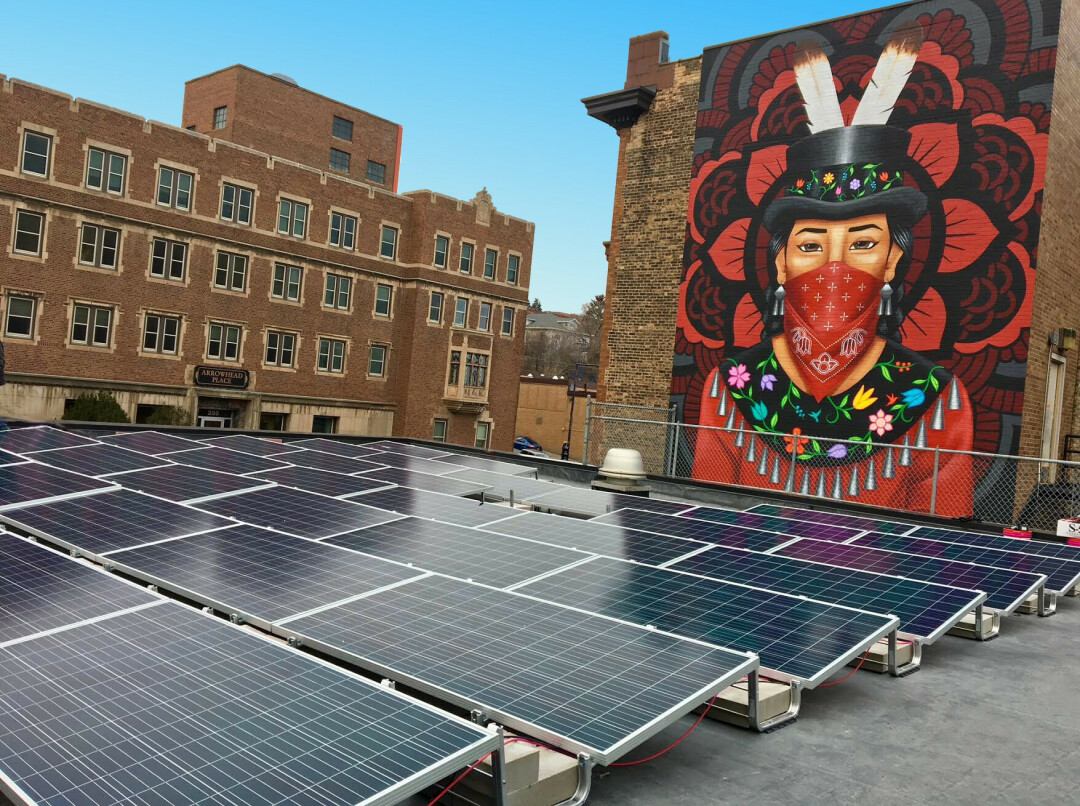AICHO has been making a difference since 1993

The American Indian Community Housing Organization (AICHO) is a Duluth nonprofit organization that works to address large community issues through an Indigenous approach.
AICHO was established in 1993 by Native community members who wanted to see social change happen in Duluth. In the nearly three decades since, AICHO has delivered big results.
In the mid-1990s, AICHO opened the region’s first culturally-specific domestic violence emergency shelter, Dabinoo’igan Shelter. More than 150 victim/survivors enter the shelter each year, accessing immediate safety, access to supportive services and resources and legal advocacy.
AICHO has worked on improving the ways that larger social systems respond to victim/survivor needs and the double impact of historic trauma and racism.
AICHO is currently working on doubling the capacity of Dabinoo’igan Shelter from 10 beds to 24 beds. With close to 600 calls for shelter that are turned away because the shelter is full, safety is an urgent issue.
While shelter can be a necessary starting place, AICHO also works on creating more affordable and stable housing. AICHO currently operates 29 units of permanent supportive housing at the Mino-Gimaajii-Bimaadizimin (We Are, All of Us Together, Beginning a Good Life) Building in downtown Duluth.
In 2007, AICHO purchased the former YWCA building, a historic property, and restored and renovated it to hold a combination of efficiency, one-, two- and three-bedroom units; a gym and children’s room; the Dr. Robert Powless Cultural Center; and an urban rooftop garden with 16.5 KW solar array and the famous Water Protector mural.
AICHO is currently working on creating 60 new units of deeply affordable housing in Morgan Park.
As a social change agent organization, AICHO has been fortunate to work directly with grassroots organizers, community advocates and regional Indigenous artists to convey issues that impact both Indigenous community and the world.
AICHO has hosted numerous events that build democracy (candidate forums, voter registration, tribal elections), deepen cultural understanding, bring issues like climate justice and missing & murdered relatives to light, and continue Indigenous practices and ceremonies (pipe and drum ceremonies, traditional storytelling and feasts).
Indigenous artists actively shaped onsite community space, adding beautiful large murals; hosting Indigenous art shows, film festivals and live performances of music, dance and theater; and creating an Indigenous-led social enterprise focused on Native art and traditional foods, the Indigenous First Art Gallery & Gift Shop.
Last year, AICHO was recognized by the McKnight Foundation as a Regional Cultural Treasure and has received other national awards on creative placemaking and cultural & climate resiliency work.
AICHO works in partnership with many different allies, from tribal nations, funding partners, local government, other community organizations and community allies.
The goal is always social change and to improve overall social and economic conditions. This has meant addressing basic needs, like safety and housing, and finding new solutions that push past generational poverty, cultural disruption and historic community losses. AICHO has invested in long strategies that will help strengthen Indigenous community and the overall region.
For example, the issue of basic food security launched a food sovereignty initiative. Food sovereignty is based on core universal principles, centered on the right to produce your own food, with an emphasis on local sources and cultural integrity.
When the Gimaajii housing program opened in 2012, AICHO staff made conscious decisions to offer healthy and fresh snacks, meals and pantry items to Gimaajii residents, instead of heavily processed foods or sugar-laden items. Traditional Indigenous foods and beverages were served in daily meals and community events.
The urban rooftop garden space was developed, where staff and residents worked together to grow vegetables, herbs, traditional and sacred plants like sage, sweetgrass and traditional tobacco. Food security expanded to not only understanding where the food comes from, but also the direct relationship with food and the spiritual experiences that accompany those relationships.
In 2018, AICHO purchased a corner grocery store (the former Fourth Street Market), which will become the region’s first Indigenous Food Market. The grocery store will offer local Central Hillside residents access within walking distance to eggs, milk, bread, fresh produce and other food items. In addition, Indigenous food will be featured. The store will have a deli and coffeeshop area.
To build greater community engagement with the Indigenous food system, AICHO developed community education events and an Indigenous Food Expo, the Indigenous Food & Art Markets (a BIPOC famers market), a co-created Native community-supported agriculture (CSA) with Native Wise Farm, and greater retail access at the AICHO social enterprise Indigenous First Art Gallery & Gift Shop.
In 2020, AICHO mobilized emergency food distribution in response to the COVID global pandemic. Food distribution happens every two weeks with curbside pickup.
On alternate weeks, food bags are delivered to unsheltered community members and older adults/elders. Food items distributed include Indigenous traditional foods, local, organic and healthier options. AICHO actively purchases from a variety of Indigenous and local vendors, strengthening the local economy and supporting a new Indigenous economy.
AICHO adheres to the words of our founder, Vicky Ybanez, that “Indigenous people not only have solutions for ourselves, but for the world at large.”
AICHO continues to work for social change using an Indigenous approach. Learn more at aicho.org
LeAnn Littlewolf is AICHO’s Co-Executive Director; Maaiin’gan Doodem (Wolf Clan), Gaa-Zagaskwaajimekaag (Leech Lake Band Tribal Citizen)